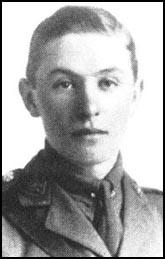James Lovegrove

James Lovegrove, the son of a master tailor from Mayfair was born in 1898. After leaving school he joined a firm of architects in London.
On the outbreak of the First World War Lovegrove was only sixteen but he came under pressure from members of the Order of the White Feather to join the armed forces. Lovegrove decided to become a soldier after attending a Vesta Tilly concert where she sung patriotic songs.
A member of the Royal North Lancashire Regiment, Lovegrove was sent to the Western Front and took part in the Battle of the Somme. He survived and by the time the Armistice was signed, he had reached the rank of lieutenant.
After the war Lovegrove became a successful businessman.
James Lovegrove died in Eastbourne in 1994.
Primary Sources
(1) James Lovegrove was interviewed about his experiences during the First World War in 1993. He explained why he joined the British Army in 1914.
On my way to work one morning a group of women surrounded me. They started shouting and yelling at me, calling me all sorts of names for not being a soldier! Do you know what they did? They struck a white feather in my coat, meaning I was a coward. Oh, I did feel dreadful, so ashamed.
So that night, to cheer myself up, I went to the music hall. The star of the show was Vesta Tilly, a great star of the time. She'd come on stage dressed as a soldier, singing patriotic songs, then she would invite men up unto the stage to join up and "take the king's shilling". Of course, there were a couple of recruiting sergeants standing ready in the wings. Now she was married to a Conservative M.P. Lord de Frece, and she got so many men into the army this way there was even a 'Vesta Tilly Brigade' fighting in France. Yet she had the nerve to refuse to go over and entertain the troops like many other artists did saying she couldn't spare the time.
(2) James Lovegrove joined the British Army when he was only sixteen.
I went to the recruiting office. The sergeant there couldn't stop laughing at me, saying things like "Looking for your father, sonny?", and "Come back next year when the war's over!" Well, I must have looked so crestfallen that he said "Let's check your measurements again". You see, I was five foot six inches and only about eight and a half stone. This time he made me out to be about six feet tall and twelve stone, at least, that is what he wrote down. All lies of course - but I was in!"
(3) After joining the British Army James Lovegrove was sent to Woolwich Common.
Woolwich Common, six hundred of us, sleeping under tents, in the middle of winter. I'll never forget my first night in the army. Mother had always told me to wear pyjamas or I'd get lumbago! Well, I was putting them on when the tent flap opened and a voice said "Cor bloody blimey! Come and have a look at this bloke, he's a getting dressed to go to bed!" Well, they all had a good laugh at me. I don't think most of them had seen pyjamas before. They all seemed to sleep naked. And the foul language! I'd never heard such swearing before in my life.
(4) James Lovegrove was shocked by the conditions on the Western Front.
The public have never, even to this day, been told how bad it was for the men. No words could adequately describe the horror of it all. I am ashamed to say the officers were fed reasonably, but the men were starving. Living conditions were so filthy that I got enteric fever, was put into a field-hospital and almost died. There was so much illness of every sort amongst us. It was truly hell on earth. Lice, rats, trench foot - that's a gangrenous condition that the men got through standing in wet mud that we lived in. And trench mouth, where the gums rot and you lose your teeth. And of course dead bodies everywhere. Also the mental fear of the dreaded sniper who'd take your head off in a flash if you so much as looked over the top of the trench.
(5) James Lovegrove was highly critical of Britain's military commanders.
The military commanders had no respect for human life. General Douglas Haig, later he was made a Field Marshal, cared nothing about casualties. Of course, he was carrying out government policy, because after the war he was knighted and given a lump sum and a massive life-pension. I blame the public schools who bred these ego maniacs. They should never have been in charge of men. Never.
(6) James Lovegrove took part in the Battle of the Somme.
We were ordered to attack the German trenches so we fell behind a tank for cover, but the tank got a direct hit by a shell. It spun round on its tracks and burst into flames. The crew were roasted alive. They couldn't get out. Somehow we made it to the German trench, their machine-gunners were all lying dead next to their guns. Our big gun barrage before our advance had killed them. I noticed they were fixed to their guns by a length of chain so they could not run away. I suppose their high command was as bad as ours. Our lads had not eaten in days so they started eating the German rations because they were starving.

